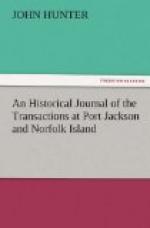Robert Webb, a seaman belonging to the Sirius, went on the 15th, to the valley above the Cascade-Bay; having obtained my permission to become a settler, if Governor Phillip should have no objection to it.
Some barley which had been sown the latter end of May, about three quarters of an acre with one bushel and an half of seed, was cut this day, and the produce was twenty-three bushels of a very fine full grain. The potatoes which were sown during the month of September, in Arthur’s vale, were all running to stalk, and not one potatoe formed at the roots: the fibres were very strong and shooting out of the ground, notwithstanding they had been well earthed: this was probably owing to the very great heat and drought which we had recently experienced. Large flocks of parroquets still infested the wheat, and made great havock in one acre; but as it ripened very fast, I did not apprehend much farther damage from them or the caterpillars, which were again become very numerous.
As it would be necessary to have the hogs and poultry near the granary, during the time of harvest, I employed a party of labourers in bringing logs to make an inclosure round the barn, and other conveniencies for the stock; and on the 30th, we began the wheat harvest.
On the 3d of December, at day-light, the Supply arrived in the road, and soon afterwards, I received my letters from Governor Phillip. In the course of the day, six men and eight women convicts were landed, with some provisions and stores for the settlement. By an order from Governor Phillip, all persons on the island were to be put to two-thirds allowance of provisions, which commenced on the 5th: the settlement at Port Jackson went to this allowance in November. Having received every thing from the Supply, that vessel sailed for Port Jackson on the 7th.
All the labourers were now employed in reaping, stacking, and thatching the wheat, which business was all finished by the 24th. Four acres of the wheat were greatly damaged by some very heavy rain, which fell from the 14th to the 18th, and caused it to shoot out; but this was put into a stack by itself for present consumption. The wheat now reaped had been sown at different periods, notwithstanding which, it was ripe nearly at the same time; but the last sown did not stock so well as that which was put more early in the ground: that which was sown in drills, suffered much from the blighting winds; and, as this island is subject to these winds at all times of the year, the method of drilling wheat or barley in rows, will not answer so well as when sown at a broad cast. The best time for sowing wheat, is from the latter end of May to the middle of June; indeed, that which was sown in August, yielded a very large sound grain; but, (as I have already observed) it did not stock so well as the other.
At sun-rise on the 25th, the colours were hoisted, in observance of Christmas-day; divine service was performed at ten o’clock, and I ordered two hogs, belonging to the crown, to be killed and issued out to the free people and convicts, at the rate of one pound and an half to each person: and, as the crop of wheat had turned out tolerably well, I ordered two pounds of flour to each man, and the women one pound each, to celebrate the festival.




